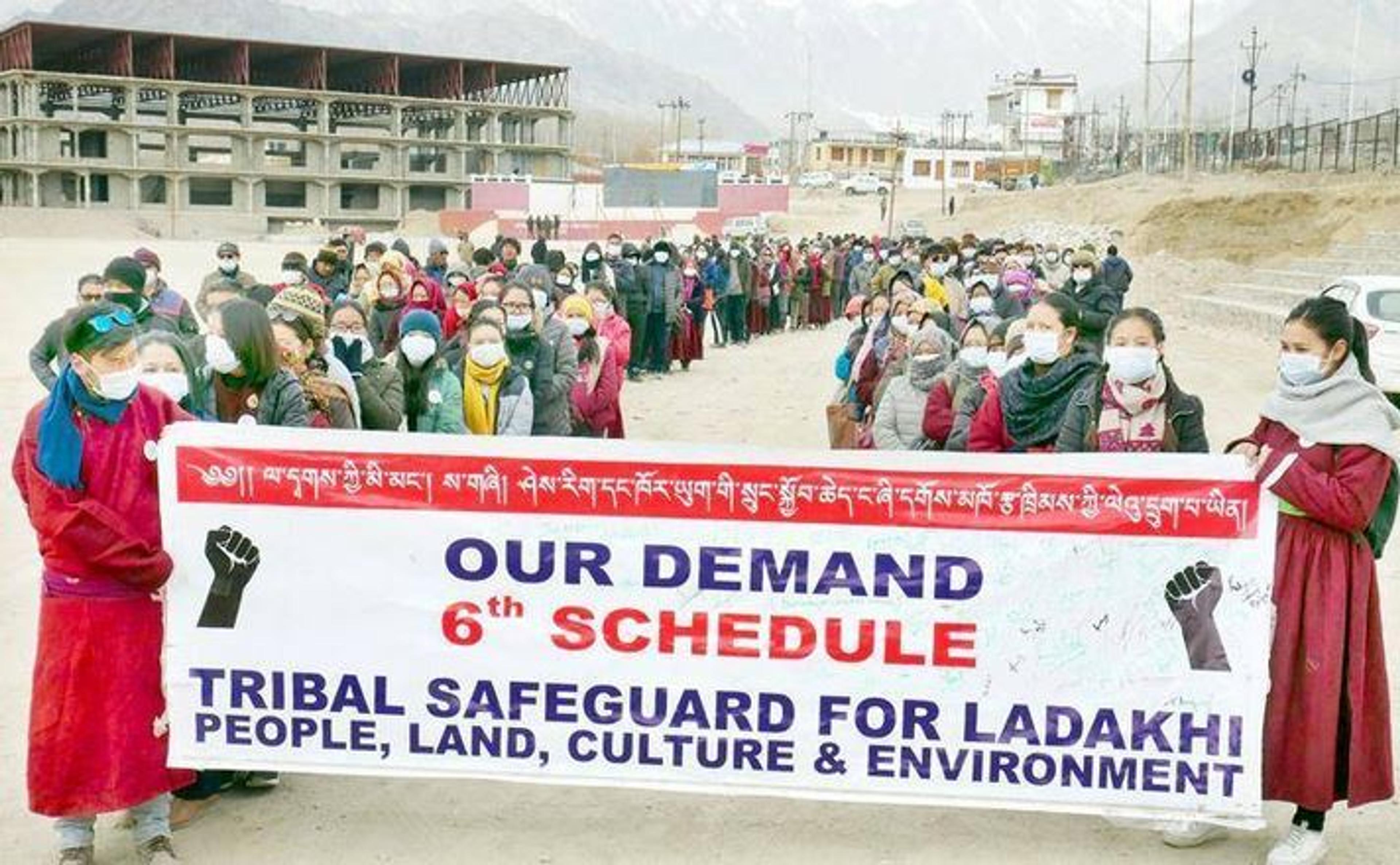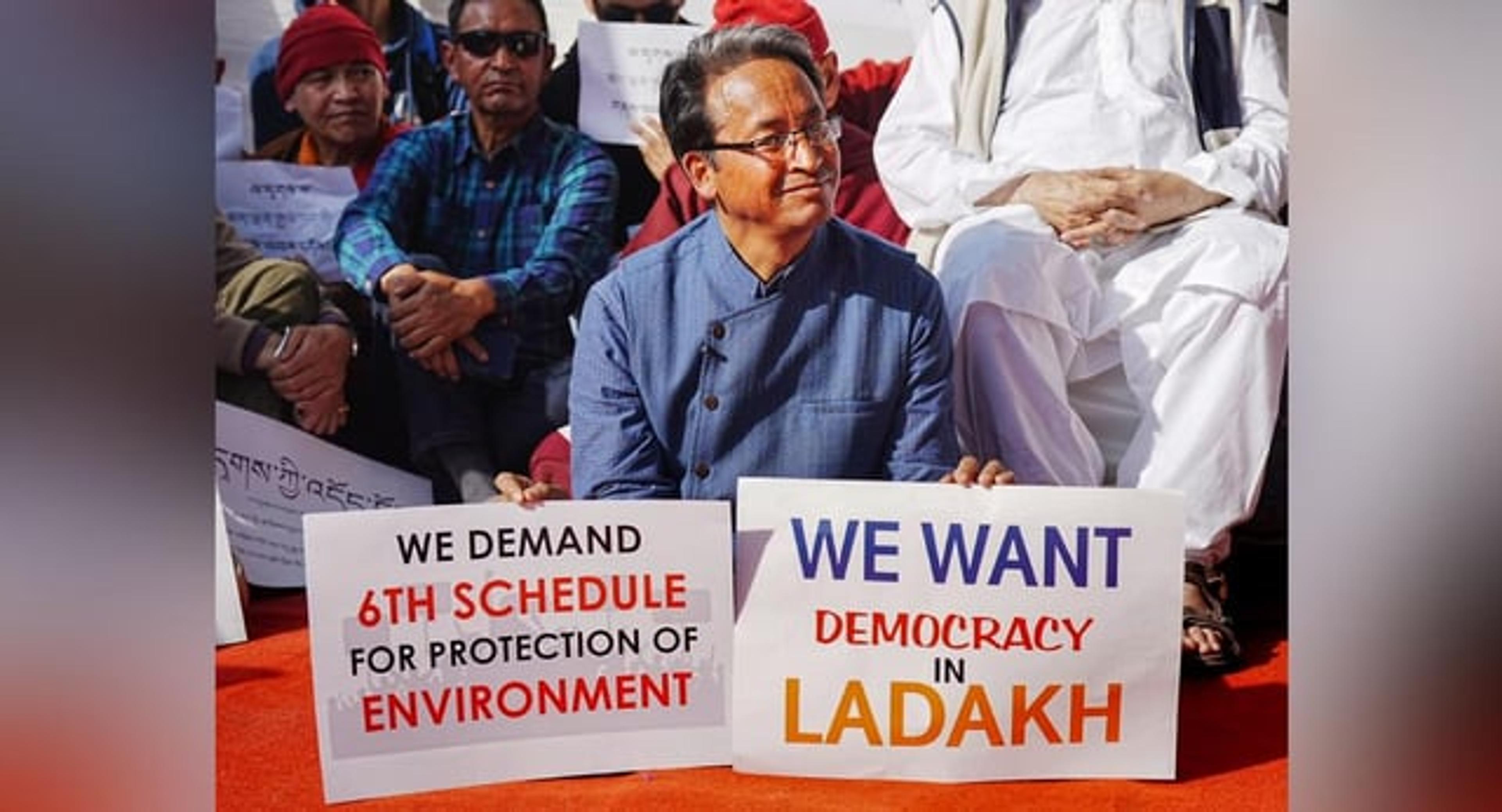Empowering Ladakh: The Case for Implementing the Sixth Schedule
Shaziya Batool Ashoor
Published
Central to Ladakh’s plea for the Sixth Schedule is the imperative to preserve its cultural identity. With a heritage spanning centuries, Ladakh boasts a vibrant mosaic of traditions, languages, and customs. The Sixth Schedule to the Constitution of India provides measures of autonomy and self-governance to the Scheduled Tribes in the hill regions of Northeast India. Implementing the Sixth Schedule would serve as a bulwark against cultural erosion, offering legal protections to safeguard and promote the distinct identities and practices of Ladakhi communities. This preservation is not merely a matter of heritage but also a fundamental aspect of ensuring the well-being and cohesion of Ladakh’s social fabric.

Protection of Land and Resources
Ladakh’s pristine environment and natural resources are the lifeblood of its people, sustaining livelihoods and ecosystems alike. However, rapid industrialization and unchecked development pose grave threats to this fragile ecosystem. By embracing the Sixth Schedule, Ladakhis seek to fortify mechanisms for the protection of their land, water, and other resources. Through community-driven governance structures empowered by the Sixth Schedule, Ladakh can chart a sustainable path forward, balancing development with environmental stewardship for the benefit of present and future generations.
Greater Autonomy
As a union territory, Ladakh currently grapples with limited autonomy in decision-making, a stark departure from the self-governing status enjoyed by states with legislative assemblies. The implementation of the Sixth Schedule offers a beacon of hope for Ladakhis yearning for greater autonomy and agency in shaping their own destiny. By vesting local communities with enhanced decision-making powers over governance and development, the Sixth Schedule empowers Ladakhis to chart a course that reflects their unique needs, priorities, and aspirations.
Inclusion in Decision-Making
At the heart of the Sixth Schedule lies the principle of grassroots democracy, ensuring the active participation of local communities in decision-making processes. Ladakhis envision autonomous district councils as forums for inclusive deliberation and collective action, where voices from every corner of the region find resonance. Through these participatory structures, Ladakhis can assert their agency in shaping policies and projects that directly impact their lives, fostering a sense of ownership and belonging in the governance process.
Protection of Tribal Rights
Ladakh is home to diverse tribal communities, each with its own distinct identity, traditions, and rights. The Sixth Schedule recognizes and safeguards these rights, ensuring that the interests of tribal populations are enshrined in law and governance. By embracing the Sixth Schedule, Ladakh reaffirms its commitment to upholding the dignity, autonomy, and well-being of its tribal communities, fostering a society founded on principles of equity, justice, and solidarity.
In advocating for the implementation of the Sixth Schedule, Ladakhis articulate a vision of empowerment, resilience, and self-determination. They seek not merely the preservation of their cultural heritage and natural heritage but also the realization of their inherent rights to govern themselves in accordance with their values and aspirations. By embracing the Sixth Schedule, Ladakh can embark on a transformative journey towards a future where its people thrive in harmony with their environment, guided by principles of inclusivity, sustainability, and equity.

Soman Wanchuk seems to be a significant figure in the fight for Ladakh’s rights and protection. His actions, including the fast-unto-death and the #ClimateFast, demonstrates a strong commitment to securing constitutional safeguards and environmental protection for Ladakh. By advocating for Ladakh’s interests and highlighting issues such as environmental conservation and cultural preservation, he is likely playing a crucial role in raising awareness and mobilizing support for the region’s concerns.
Preserving Ladakh’s unique culture and language is important amidst modernization and migration. The ability to peacefully resolve inter-religious differences reflects the maturity and tolerance of Ladakhi society. Compared to other regions in India, Ladakh has managed to navigate inter-religious dynamics with a focus on peace and harmony, which could be attributed to various factors.
The focus on environmental protection, cultural preservation, and indigenous rights reflects a broader global trend towards prioritizing sustainability and community sovereignty over short-term economic gains. By bringing these issues to the forefront and contrasting them with more traditional electoral concerns, Wanchuk and the movement he represents are reshaping the political discourse in Ladakh and fostering a sense of collective responsibility towards safeguarding the region’s natural and cultural heritage.
In Ladakh’s high where mountains rise,
Beauty lifts souls to azure skies.
Valleys deep, rivers pure endure,
Culture rich, ancient, and sure,
History whispers in each stride,
Of resilience and strength, no hide.
From Leh to Kargil, spirit strong,
Amidst snow’s call, they belong.
Ladakh, jewel of the north,
In your arms, our true worth.
Let the 6th schedule be their choice,
To thrive, rejoice, and raise their voice.
Preserve the land, its lore, its pride,
For generations, let it ride.
Unity and harmony, let them prevail,
In Ladakh’s heart, let love never pale.
Shaziya Batool Ashoor is a student pursuing English Honors at Jamia Millia Islamia.
Edited by: Zakia Tasnim Ahmed




